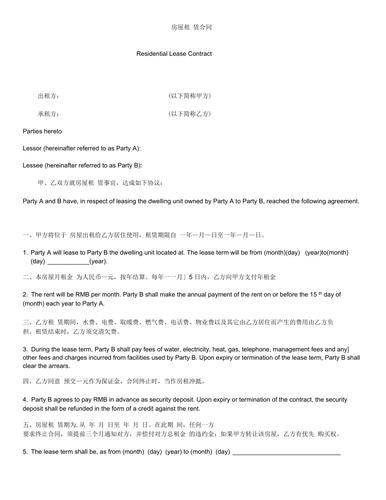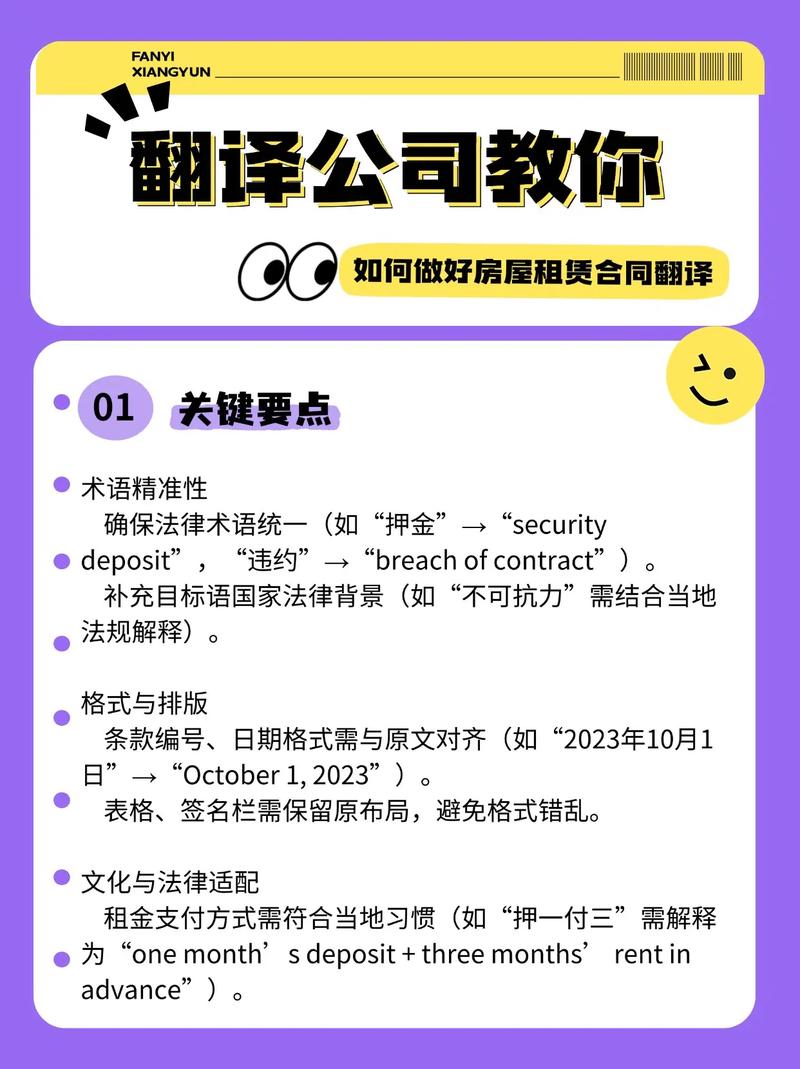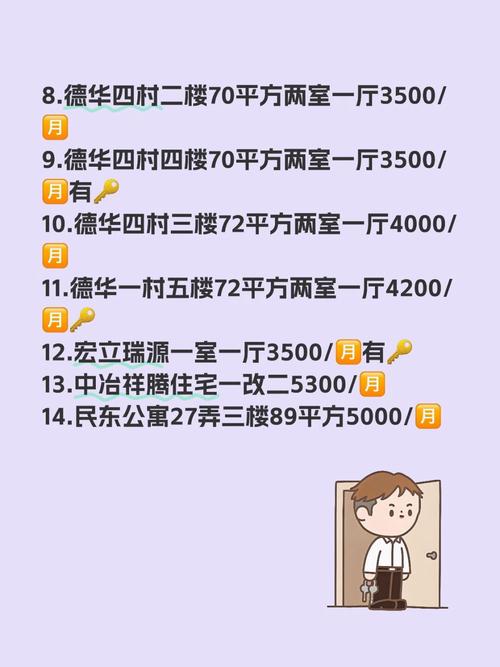“租房”在不同语境下有多种英文表达方式,具体翻译需结合场景、动作主体和语义侧重,以下从核心词汇、场景化表达、语法功能及文化差异四个维度展开详细解析,帮助准确选用对应译法。

核心词汇:Rent与Lease的区分
“租房”最直接的对应词是“rent”和“lease”,二者虽常混用,但存在细微差别:
- Rent:侧重“短期租赁”或“支付租金”的动作,强调即时性和周期性(如按月支付)。“我想租这套公寓”译为“I want to rent this apartment”,rent”作动词,表示“租用”的动作;名词形式“rent”则指“租金”,如“the monthly rent”(月租金)。
- Lease:多用于“长期租赁”,通常涉及具有法律约束力的合同,强调“签订租约”的行为。“我们签了一年的租约”译为“We signed a one-year lease”,此处“lease”作名词,指“租约”;动词形式“lease”则表示“出租(长期)”,如“The company leased the building for ten years”(该公司租用了该建筑十年)。
日常口语中“租房”多用“rent”,正式合同或长期租赁场景则用“lease”。
场景化表达:不同主体的“租房”
根据“租房”的动作主体(租客/房东)和场景(住宅/商业),需搭配不同词汇组合:
租客视角:主动租用
- Rent + 场所:最通用的表达,适用于住宅、车辆等短期租赁。
例句:I'm looking to rent a house near the city center.(我想在市中心租一套房子。) - Rent + 场所 + from + 房东:强调“从某人处租用”。
例句:She rented the apartment from a local landlord.(她从一个本地房东那里租了这套公寓。) - Lease + 场所:正式语境,突出“签订长期租约”。
例句:They plan to lease the office space for five years.(他们计划租下这个办公空间五年。)
房东视角:出租房屋
- Rent out + 场所:表示“将房屋出租给他人”。
例句:My parents rent out their spare room on weekends.(我父母周末出租闲置房间。) - Let + 场所:英式英语常用,相当于美式英语的“rent out”。
例句:He lets his flat to students during the summer.(夏天他把公寓租给学生。) - Lease out + 场所:长期出租,强调合同约束。
例句:The company leased out its vacant properties to generate income.(该公司出租闲置房产以增加收入。)
场景细分:住宅与商业
- 住宅租房:
- 公寓:rent an apartment/flat
- 房子:rent a house
- 单间:rent a room
- 商业租房:
- 办公室:lease an office space
- 商铺:rent a commercial shop
- 厂房:lease a warehouse
常见场景词汇对照表
| 中文场景 | 英文表达 | 例句 |
|---|---|---|
| 租公寓 | rent an apartment | I need to rent a two-bedroom apartment. |
| 租办公室 | lease an office | They leased a whole floor for the company. |
| 出租房间 | rent out a room | She rents out her basement to a tenant. |
| 短期租房 | rent short-term | We're renting a car for a week. |
| 长期租房 | lease long-term | He leased the land for agricultural use. |
语法功能:动词与名词的灵活运用
“租房”在句子中可作动词或名词,需根据语法结构选择:

- 作动词:表示“租用”的动作,主语通常是租客。
例句:Do you rent or own your home?(你是租房还是自有住房?) - 作名词:表示“租赁行为”或“租金”,需搭配限定词。
例句:The rent for this studio is $1,200 per month.(这套单间公寓的月租金是1200美元。)
特殊表达:“租房市场”译为“rental market”,如“The city's rental market is very competitive.”(该市的租房市场竞争激烈。)
文化差异与地道表达
英语国家“租房”场景中,需注意以下习惯表达:
- “租客”与“房东”:
- 租客:tenant(通用)或renter(口语),商业租赁中常用lessee(承租人)。
- 房东:landlord(住宅房东)或lessor(出租方,法律术语)。
- “押金”与“租金”:
- 押金:security deposit(美式)或deposit(英式),通常在租约到期后退还。
- 预付租金:rent in advance,如“Pay two months' rent in advance.”(预付两个月租金。)
- “合租”:
- 合租公寓:share an apartment,常用“roommate”指“室友”。
- 例句:I'm looking for a roommate to share the rent.(我找室友分摊租金。)
常见错误与注意事项
- 混淆“rent”和“let”:
- “rent”可作动词(租用)和名词(租金),“let”仅作动词(出租,英式),不可作名词。
- 错误表达:“The rent is high.”(误用let:The let is high.)
- 忽略“lease”的正式性:
日常口语中“租一周的房子”不宜用“lease”,应说“rent for a week”。
- “租房”与“买房”:
买房:buy a house/own a property,与“rent”形成对比。
相关问答FAQs
Q1: “租房合同”应该翻译成“rent contract”还是“lease agreement”?
A: 两者均可,但“lease agreement”更正式且常用,尤其指具有法律效力的长期租约合同。“Rent contract”口语中也可使用,但不如“lease agreement”严谨。“You need to read the lease agreement carefully before signing.”(签约前你需要仔细阅读租房合同。)

Q2: “短租”和“长租”在英文中如何区分?
A: “短租”通常译为“short-term rental”,指租赁期限较短(如几周、几个月),常见于民宿、临时住所;“长租”则译为“long-term lease”,指租赁期限较长(通常一年及以上),需签订正式租约。“Airbnb is popular for short-term rentals, while long-term leases are common for local residents.”(爱彼迎适合短租,而长租则更受当地居民欢迎。)





Renting a house in English is renting an apartment or "house renting.